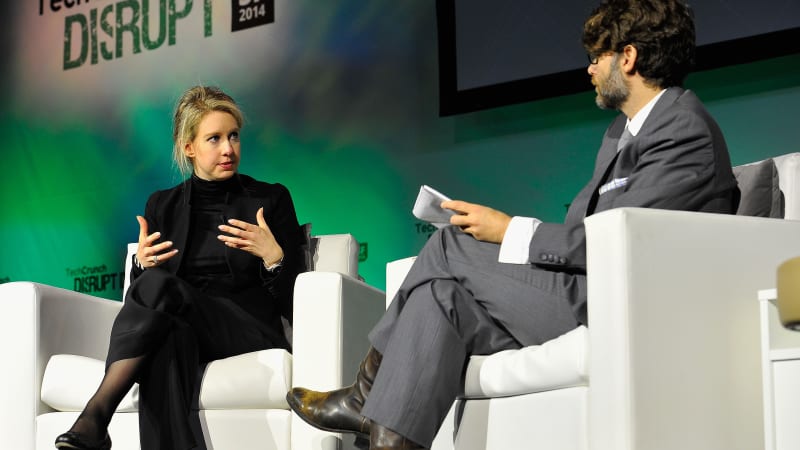Even Superstar Students Need Help: The Cautionary Tale of Elizabeth Holmes

Elizabeth Holmes dropped out of Stanford University to work on a tech startup called Theranos. She quickly rose to fame and garnered tens of millions dollars in investments. But it all came crashing down when she was unmasked as a fraud. Sued by her own investors and stripped of leadership in her own company, what followed was total public humiliation.
Every high school student I tell this story to understands that the moral of the story is the importance of honesty. However, the more talented the student is, the more likely I am to point out the hidden moral, the one that Elizabeth Holmes never learned. It’s not just about being honest. There’s a far greater lesson at play here. Elizabeth Holmes never learned how to ask for help.
For Holmes, that lesson would come at a devastating cost. Holmes was the innovator behind a promising new microchip technology that could be used to measure the chemicals in human blood. The development earned her cover stories in countless Silicon Valley magazines.
The limelight was short-lived. It wasn’t long before her employees were making claims to various sources that her technology never really worked. Even worse, they revealed that they had been forced to fake the science in order to keep tricking investors. Holmes won contracts with national drugstore chains to sell her medical technology. Her employees knew that people’s lives were being put in danger by the fake science.
As a scientist myself, I was struck most by the fact that Elizabeth Holmes never found any experts whom she could hire to solve her faulty technology. What went wrong? The more I reflected on her story, the clearer it became. Holmes was talented, but she was also consumed by this talent. I came to see that there was a lesson Holmes never learned as a high schooler. I work hard to ensure that the talented high school students whom I mentor learn this lesson before it’s too late.
When I tell the story of Elizabeth Holmes, I do so with three assumptions in mind:
Assumption 1: Elizabeth Holmes was smart, assuming she didn’t cheat in school and on her standardized tests. After all, she was an undergraduate at Stanford.
Assumption 2: Silicon Valley is a mecca of technology and biotechnology. There are numerous research universities within a 1-2 hour drive. Since the field of measuring blood chemicals existed long before Holmes was born, there were almost certainly at least several hundred people whom she could have hired as consultants. With the considerable investment that she received, she could have paid a consultant quite handsomely.
Assumption 3: Elizabeth Holmes was familiar with the concept of a Non-Disclosure Agreement (NDA), which is a legal promise from anyone she hires that they will not steal her ideas and start their own company with it. Holmes was able to secure tens of millions of investment dollars. It seems almost impossible that she’s never heard of an NDA.
So let’s see where these three assumptions lead us:
- Holmes was not stupid.
- The talent to help her existed nearby and was affordable.
- But, she failed to get the help early on. Her lies quickly grew out of control.
My conclusion: Holmes did not know how to ask for help….
Asking for help requires humility, especially if you are a talented person who is accustomed to being the best. Humility is like intellect; it is a muscle that needs to be conditioned through routine usage or it won’t work the way you need it to when the time comes.
Knowing the rules of basketball is one thing, but being able to dribble the ball or score from far away is something else entirely. The more I thought about the story of Holmes and Theranos, the more I was reminded of my superstar students who had never really known defeat. Many of them ended up getting into Stanford and other top universities. In fact, the only students who refused to ask for help when they should have were the superstars. I’ve never seen this problem in the other categories of students that I’ve mentored.
Like my superstar students, I think Elizabeth Holmes was so used to winning – even though winning wasn’t always easy – that she never had to learn how to ask for help.
Asking for help meant that Holmes would have first had to admit to herself that: “Yes, I’m the superstar who dropped out of Stanford – because, that’s how confident I am – and got millions in investment. But, ya know what? I don’t know how to solve this problem by myself.”
For a superstar, this is a hard pill to swallow. The earlier we learn this lesson, the easier it is to bear. The longer we wait, the more crushing it becomes to our ego.
“Learn to appreciate your failures and defeats,” I tell my talented students. “As odd as this may sound, it’s important to not always win.”
In fact, if you’ve ever faced a setback due to injury, defeat, health crisis, or emotional trauma, you’ll actually be way ahead of Elizabeth Holmes in this regard. You’ve learned that even talented students can struggle. Even talented students can be humbled. Even talented students need to ask for help.
“No one wins every time,” I make sure to tell my superstar students. “Humility is a life skill that you can’t get from a perfect GPA, 1600 SAT score, or 36 ACT score.”
Photo of Elizabeth Holmes by Tech Crunch used with permission under CC BY 4.0.